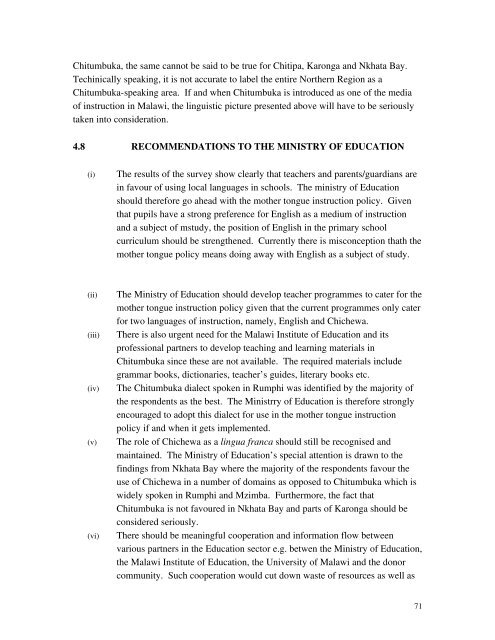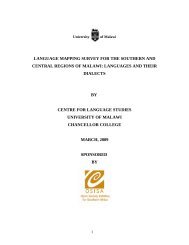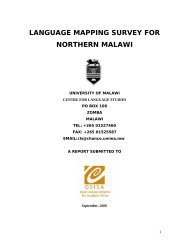SOCIOLOLINGUISTIC SURVEYS - Centre for Language Studies
SOCIOLOLINGUISTIC SURVEYS - Centre for Language Studies
SOCIOLOLINGUISTIC SURVEYS - Centre for Language Studies
Create successful ePaper yourself
Turn your PDF publications into a flip-book with our unique Google optimized e-Paper software.
Chitumbuka, the same cannot be said to be true <strong>for</strong> Chitipa, Karonga and Nkhata Bay.<br />
Techinically speaking, it is not accurate to label the entire Northern Region as a<br />
Chitumbukaspeaking area. If and when Chitumbuka is introduced as one of the media<br />
of instruction in Malawi, the linguistic picture presented above will have to be seriously<br />
taken into consideration.<br />
4.8 RECOMMENDATIONS TO THE MINISTRY OF EDUCATION<br />
(i)<br />
The results of the survey show clearly that teachers and parents/guardians are<br />
in favour of using local languages in schools. The ministry of Education<br />
should there<strong>for</strong>e go ahead with the mother tongue instruction policy. Given<br />
that pupils have a strong preference <strong>for</strong> English as a medium of instruction<br />
and a subject of mstudy, the position of English in the primary school<br />
curriculum should be strengthened. Currently there is misconception thath the<br />
mother tongue policy means doing away with English as a subject of study.<br />
(ii)<br />
(iii)<br />
(iv)<br />
(v)<br />
(vi)<br />
The Ministry of Education should develop teacher programmes to cater <strong>for</strong> the<br />
mother tongue instruction policy given that the current programmes only cater<br />
<strong>for</strong> two languages of instruction, namely, English and Chichewa.<br />
There is also urgent need <strong>for</strong> the Malawi Institute of Education and its<br />
professional partners to develop teaching and learning materials in<br />
Chitumbuka since these are not available. The required materials include<br />
grammar books, dictionaries, teacher’s guides, literary books etc.<br />
The Chitumbuka dialect spoken in Rumphi was identified by the majority of<br />
the respondents as the best. The Ministrry of Education is there<strong>for</strong>e strongly<br />
encouraged to adopt this dialect <strong>for</strong> use in the mother tongue instruction<br />
policy if and when it gets implemented.<br />
The role of Chichewa as a lingua franca should still be recognised and<br />
maintained. The Ministry of Education’s special attention is drawn to the<br />
findings from Nkhata Bay where the majority of the respondents favour the<br />
use of Chichewa in a number of domains as opposed to Chitumbuka which is<br />
widely spoken in Rumphi and Mzimba. Furthermore, the fact that<br />
Chitumbuka is not favoured in Nkhata Bay and parts of Karonga should be<br />
considered seriously.<br />
There should be meaningful cooperation and in<strong>for</strong>mation flow between<br />
various partners in the Education sector e.g. betwen the Ministry of Education,<br />
the Malawi Institute of Education, the University of Malawi and the donor<br />
community. Such cooperation would cut down waste of resources as well as<br />
71





